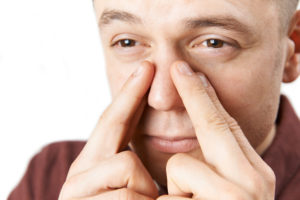Acute Sinusitis: Causes, Symptoms, and Treatments
Acute sinusitis (also called acute rhinosinusitis), is one of the most common ailments that cause people to visit their doctor. Most cases of sinusitis clear up on their own, but if your symptoms persist longer than a week, contact Palm Beach Sinus Doctors. Our goal is to help treat your symptoms and address the underlying causes.
What is acute sinusitis?
Sinusitis is an inflammation of the tissue that lines your sinuses. There are four sinus cavities in your head, connected by narrow channels. Usually, the sinus cavities are filled with air, but they can become blocked by fluid. When this happens, the sinuses might become infected.
The common cold virus or allergies cause over 94% of acute sinusitis cases. There are rare cases of acute sinusitis caused by bacterial or fungal infections that cause the sinuses to swell.
Symptoms of acute sinusitis
The most common symptomspeople experience are:
- Congestion, sometimes accompanied by a cough
- Thick, green or yellow discharge from your nose
- Stuffy nose and difficulty breathing
- Facial pain, tenderness or pressure around your eyes, cheeks, nose, or forehead
- Loss of smell and taste
Some people also experience headaches, ear pain, toothaches, and fever. These symptoms are caused by the increased pressure in your sinus cavities.
Contact the doctor if your symptoms last more than a week, you have a persistent fever, or if they worsen after seeming to improve.
Symptoms of a severe infection include:
- Stiff neck
- Double vision or changes in your vision
- Confusion
- Pain, swelling, or redness around your eyes
- High fever
If you develop any of these symptoms, you should seek emergency medical treatment.
Treatments for acute sinusitis
About 70% of people who receive treatment for acute sinusitis from a family doctor are given an antibiotic. Unfortunately, antibiotics are not effective against viral infections, and unnecessary antibiotic use can lead to long-lasting effects on your microbiome, which may result in other types of infections, allergies, and other illnesses. Antibiotics should only be used in extreme cases.
Most cases of acute sinusitis clear up on their own. The doctor may recommend treatments to help relieve your symptoms and speed the healing process.
- The best treatment for acute sinusitis is usually a nasal steroid spray like Flonase. They help treat inflammation.
- A saline nasal spray helps rinse out your nasal passages.
- Over the counter decongestants help clear the mucus congestion in your sinus cavities.
- Over the counter pain relievers like ibuprofen or acetaminophen treat headaches, tenderness, and pain.
It is also important to rest and stay hydrated. This will help your body fight the infection.
Moistening your sinus cavities can also help relieve symptoms and speed the recovery process. Take a steaming hot shower and breath in deeply. The warm air and steam will help the mucus drain and ease the pressure and pain. You can also do this by draping a towel over your head as you lean over a pot or bowl of steaming water.
You can also use a neti pot or Sinus Rinse bottle to rinse your nasal passages. This is also called nasal lavage, and it can help clear your sinuses.
One preventative treatment for acute sinusitis is to stay up to date on your allergy shots, especially if intranasal allergies are a potential cause for your sinusitis.
What are the risk factors for acute sinusitis?
Though the common cold usually causes acute sinusitis, you may be predisposed to developing sinusitis if you have certain conditions or risk factors.
Smoking or exposure to second-hand smoke and other pollutants can increase your risk for sinusitis.
Participating in activities that result in a lot of pressure changes, like flying or scuba diving, can make you more susceptible to sinusitis.
Some medical conditions, like cystic fibrosis or immune system disorders like HIV/AIDS can make you more susceptible to acute sinusitis. Hay fever and other allergies that impact your sinuses also increase your risk factor.
Some people have nasal passage abnormalities that make it easier for sinusitis to develop, like a deviated nasal septum or nasal polyps.
How to prevent acute sinusitis
There are several ways you can avoid getting acute sinusitis.
Since a virus most often causes sinusitis, wash your hands frequently. Minimize your contact with people who have colds and respiratory or sinus infections.
Getting an annual flu shot, treating allergies properly, and taking an oral decongestant when you are congested are very proactive methods of preventing acute sinusitis.
Use a humidifier in the winter or during dry weather. This helps keep your sinuses moist.
Don’t underestimate the value of a healthy diet! Giving your body all the vitamins and nutrients it needs will help you fight off infections and viruses year-round.
If you have a nasal passage abnormality like nasal polyps or a deviated septum, the doctor might recommend surgery to prevent sinusitis, especially if you tend to develop acute cases of sinusitis easily.
If you have symptoms of acute sinusitis, contact the Palm Beach Sinus Doctors today. Our goal is to help you address your symptoms and the underlying causes.
